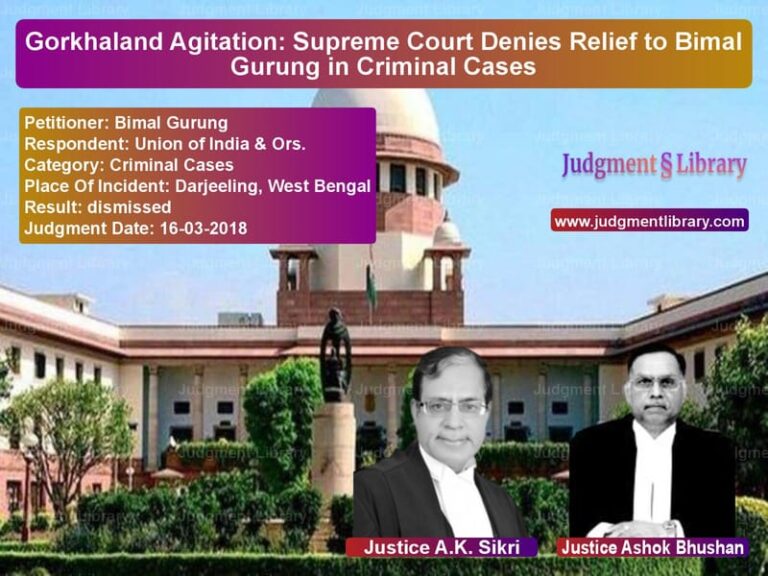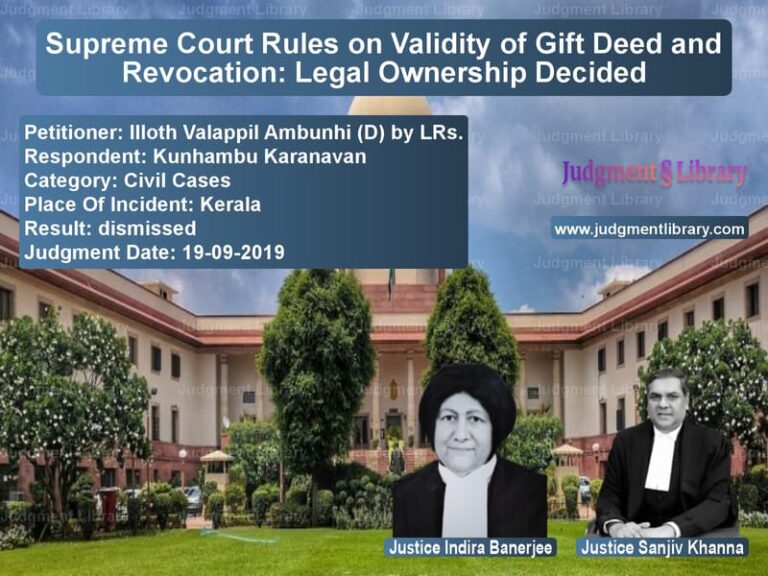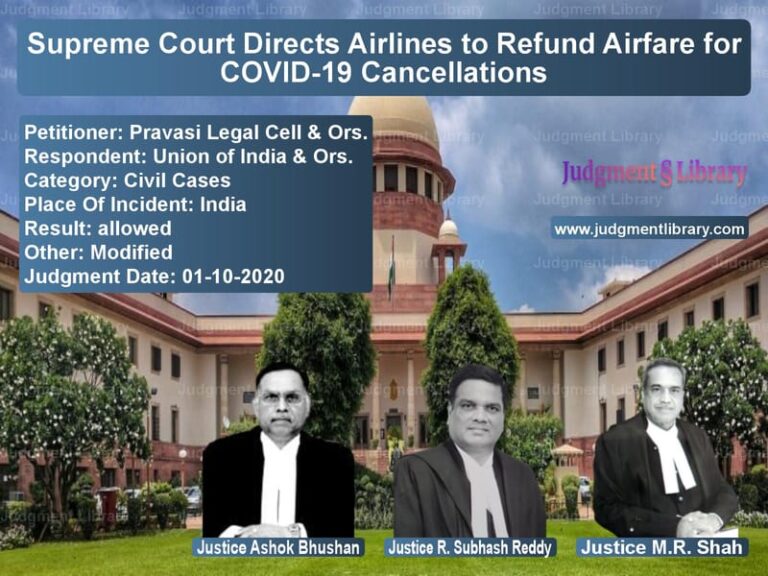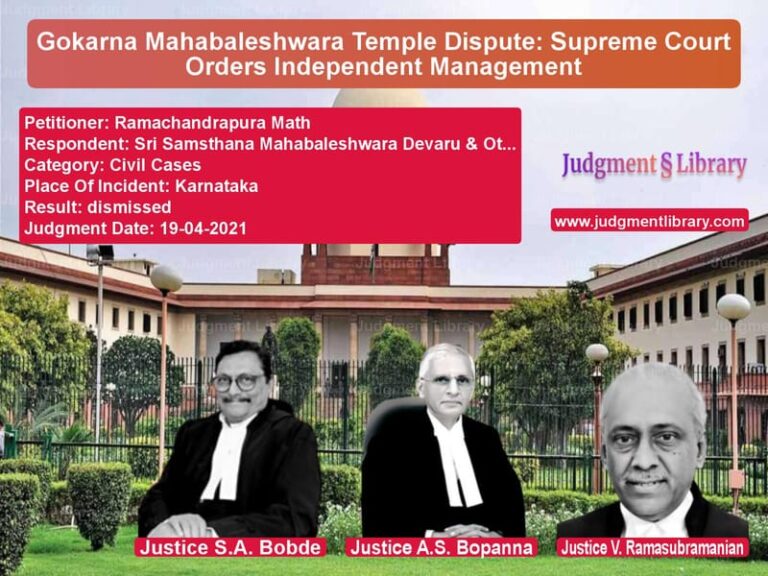Supreme Court Directs JNTU to Complete Affiliation Process for Engineering Colleges
The Supreme Court of India, in its judgment dated 18 November 2021, addressed the issue of university affiliations for new courses in engineering colleges in Telangana. The case involved Jawaharlal Nehru Technological University (JNTU) and multiple engineering institutions, including Crescent Educational Society, which challenged the university’s requirement to seek the State Government’s No Objection Certificate (NOC) before granting affiliations.
Background of the Case
The controversy arose when JNTU, the affiliating university for engineering colleges in Telangana, sought approval from the State Government before granting affiliations to new courses and intake expansions approved by the All India Council for Technical Education (AICTE). The High Court of Telangana, through its interim orders dated 5 October 2021, 25 October 2021, and 26 October 2021, ruled that JNTU’s actions were contrary to the Supreme Court’s precedent in Jaya Gokul Education Trust v. Commissioner & Secretary to Government Higher Education Department, Kerala (2000).
The High Court directed JNTU to proceed with counseling and admissions for students in the second phase, considering the AICTE’s approval. JNTU, however, challenged these interim orders in the Supreme Court.
Read also: https://judgmentlibrary.com/supreme-court-enhances-compensation-for-land-acquisition-in-karnataka/
Arguments by JNTU (Appellant)
JNTU, represented by Senior Counsel Mr. C.S. Vaidyanathan, made the following arguments:
- The university’s regulations require approval from the State Government before granting affiliations.
- The role of the State Government is crucial in determining the educational needs of a region.
- The Supreme Court’s earlier judgment in Jaya Gokul Education Trust has been distinguished in subsequent decisions.
- Allowing institutions to admit students without finalizing affiliation would create legal complications.
Arguments by the Respondent Institutions
The engineering colleges, represented by Senior Counsel Mr. S. Niranjan Reddy, countered JNTU’s claims, arguing that:
- Once AICTE had granted approval for new courses or intake increases, JNTU had no legal basis to demand a State Government NOC.
- The insistence on an additional NOC from the State Government was contrary to AICTE’s regulatory framework.
- JNTU was overstepping its authority by delaying the affiliation process.
Supreme Court’s Observations
The Supreme Court, comprising Justices Dhananjaya Y Chandrachud and A.S. Bopanna, carefully analyzed JNTU’s regulations and prior judicial precedents. The Court noted:
- Regulations 5.5, 5.6, and 6.1 of JNTU clearly stipulate that the university must obtain State Government approval before granting affiliations.
- The role of the State Government in regulating educational institutions has been upheld in past Supreme Court decisions.
- The High Court had relied on Jaya Gokul Education Trust, but subsequent rulings have recognized the importance of State Government oversight.
Key Supreme Court Rulings Cited
The Supreme Court referred to key precedents, including:
- Jawaharlal Nehru Technological University Registrar v. Sangam Laxmi Bai Vidyapeet (2019) – Emphasizing the necessity of a State Government NOC for opening new courses.
- A.P.J. Abdul Kalam Technological University v. Jai Bharath College of Management and Engineering Technology (2021) – Recognizing the role of universities in scrutinizing institutional standards.
Final Judgment
The Supreme Court modified the High Court’s interim order and directed JNTU to complete the affiliation process within 10 days. The key directives were:
- Since the Telangana Government had granted its NOC on 1 November 2021, JNTU must complete the affiliation process within 10 days.
- JNTU must ensure that institutions meet infrastructure and faculty requirements before granting affiliations.
- JNTU must submit a report on the affiliation process to the High Court.
- The High Court will take further decisions based on JNTU’s report.
Implications of the Judgment
The Supreme Court’s ruling has significant implications for higher education institutions:
- Clarification on AICTE and State Government Roles: While AICTE approves new courses, State Governments and affiliating universities have regulatory oversight.
- Streamlining the Affiliation Process: The ruling ensures that universities cannot delay affiliations indefinitely by waiting for State Government approvals.
- Protecting Student Interests: The judgment prevents situations where students are admitted to unapproved courses, which could affect their future academic prospects.
The Supreme Court’s decision strikes a balance between regulatory compliance and ensuring smooth academic progress for students. By mandating a structured timeline for affiliations, the ruling reinforces accountability in the education sector.
Read also: https://judgmentlibrary.com/correction-in-revenue-authority-judgment-supreme-court-modifies-order/
Petitioner Name: Jawaharlal Nehru Technological University.Respondent Name: Crescent Educational Society & Ors..Judgment By: Justice Dhananjaya Y Chandrachud, Justice A.S. Bopanna.Place Of Incident: Telangana.Judgment Date: 18-11-2021.
Don’t miss out on the full details! Download the complete judgment in PDF format below and gain valuable insights instantly!
Download Judgment: jawaharlal-nehru-tec-vs-crescent-educational-supreme-court-of-india-judgment-dated-18-11-2021.pdf
Directly Download Judgment: Directly download this Judgment
See all petitions in Education Related Cases
See all petitions in Judgment by Dhananjaya Y Chandrachud
See all petitions in Judgment by A. S. Bopanna
See all petitions in partially allowed
See all petitions in Remanded
See all petitions in supreme court of India judgments November 2021
See all petitions in 2021 judgments
See all posts in Civil Cases Category
See all allowed petitions in Civil Cases Category
See all Dismissed petitions in Civil Cases Category
See all partially allowed petitions in Civil Cases Category







